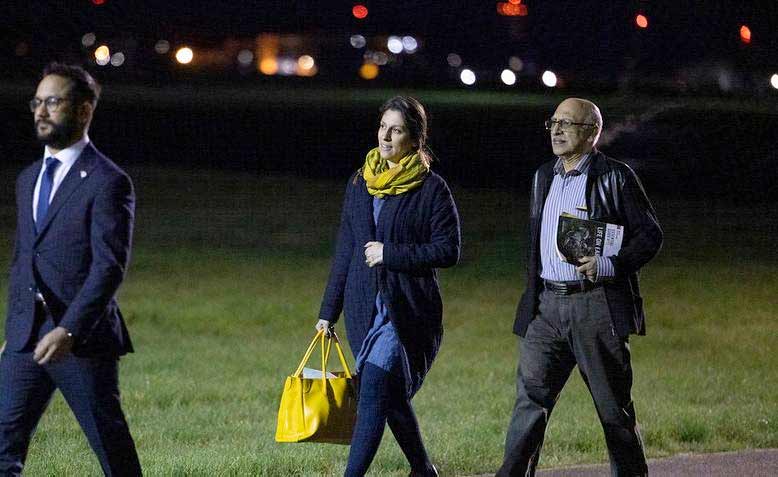 Nazanin Zaghari-Ratcliffe and Anoosheh Ashoori, Photo: Simon Dawson / No 10 Downing Street Flickr / licensed under CC BY-NC-ND 2.0, linked at bottom of article
Nazanin Zaghari-Ratcliffe and Anoosheh Ashoori, Photo: Simon Dawson / No 10 Downing Street Flickr / licensed under CC BY-NC-ND 2.0, linked at bottom of article
The release of Nazanin Zaqhari-Ratcliffe points towards a realignment of global tensions, argues Terina Hine
The news of Nazanin Zaghari-Ratcliffe’s return to Britain was welcome news indeed. Nazanin’s incarceration should never have happened and should never have lasted six years; but her release is more a reflection of recent international events and economic consequences than any hard-won negotiations by our foreign secretary, Liz Truss.
At yesterday’s press conference Nazanin made her own view clear: she owed no debt of gratitude to the current foreign secretary, nor to any of the four previous post holders – the Prime Minister among them. Instead, she asked why it had taken five foreign secretaries for her to gain her freedom, and why it had taken six long years for her to be released. Six lost years in which her daughter grew from a two-year-old toddler to an eight-year-old school girl.
The answer, it appears, is simple. Nazanin’s release was secured after Britain paid down its £400m longstanding debt to Iran – a debt that dates from the 1970s no less – and which the Iranians had demanded as a condition of her release since 2016.
Yet, for these past six years, successive Tory governments have refused to even acknowledge that Nazanin’s incarceration was linked to the debt in any way. Events however have revealed otherwise.
Nazanin’s lawyers contacted the government multiple times about the money and had suggested different ‘humanitarian’ ways the government could pay while avoiding coming into conflicting with US-imposed sanctions. Four letters were sent by the lawyers between 2019 and 2020 explaining how this might be achieved. But all suggestions were ignored. According to Nazanin’s lawyers, the Foreign Office was operating at the “behest of the US government”; in private meetings with Nazanin’s family they refused to discuss either the debt or its repayment.
But that is not all. At the press conference, MP Tulip Siddiq, who has been campaigning hard for her constituent’s release, raised the question of the arrest and detention of three Iranians in 2013 as being a contributing factor in the taking of Nazanin in the first place.
The three Iranians were arrested and detained at London’s Heathrow when they came to the UK with the intention of negotiating the debt repayment. According to Siddiq this incident most likely contributed to “important people in the Iranian regime wanting to take matters into their own hands” and take “direct action”.
So it is hardly surprising Nazanin is not feeling as thankful towards the government as some have suggested she ought.
But of course, the release of Nazanin cannot be seen in isolation; it is inextricably linked to current international events. Since Russia invaded Ukraine on 24 February the world has been upended and forced to realign. Focus for western powers has been averted from the Middle East to wars closer to home, and to the energy crisis the war has precipitated. Hence Iran, sitting on vast oil reserves, is rapidly being readmitted into the international community.
So much so that last week’s Iranian attack on a US army base in Erbil, northern Iraq, has gone largely ignored by the western media, regardless that the assault was clearly targeted at the US and its allies. Iran’s state media admitted the attack was carried out against Israeli “strategic centres” in Erbil; online videos showing at least five Iranian ballistic missiles hitting the US base in Erbil.
Compare this to when, in January 2020, Iran fired at a US base following America’s assassination of Iranian military commander, Qasem Soleimani. In both instances casualties were avoided, but back in 2020 the attack was called an “act of war” and many feared it would result in serious military escalation. President Trump was thankfully pulled back from the brink by his more rational generals, and exacted his revenge through imposing deeper sanctions. But this latest strike has gone both unreported and unnoticed. Neither Iraqi nor US officials in the region have been permitted to discuss the event with the media, and the few details available are pretty opaque. Changing times indeed.
Having Iranian crude oil back on the international market would give a significant boost to supply and stability, and no doubt provide some help for Biden’s midterm elections. So, just days after the release of the two British hostages it appears that an agreement on sanctions and the Iran nuclear deal is also imminent.
As the US terminates oil imports from Russia and Europe attempts to reduce its dependence on Russian energy, Iranian oil provides an attractive alternative. It seems that relations with Iran are being thawed so that those with Russia can be frozen.
Before you go
Counterfire is growing faster than ever before
We need to raise £20,000 as we are having to expand operations. We are moving to a bigger, better central office, upping our print run and distribution, buying a new printer, new computers and employing more staff.

